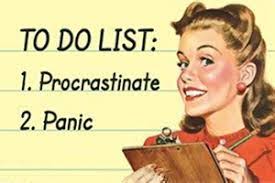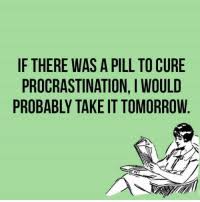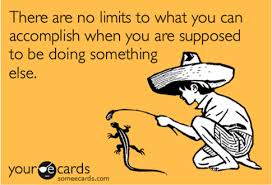







Author's note: for the first time I am writing about a subject in which I truly have expertise!
The essential mechanism of procrastination is that we know we should do something but the action is stressful, tedious, hard, painful, scary or even repellent, so we tell ourselves we will do it later. Yet we hope the "later" can be put off for as long as possible, preferably indefinitely. Self-deception is often involved, as we pretend we will do the activity we are avoiding, but we know that we really don't want to, and that we will avoid doing it if at all possible. Somehow, we think we can transfer the pain of the activity we are putting off onto our future self, imagining that this will make it less irksome.
Procrastination is related to living in the future, as opposed to doing things in the present. You think, "At some future time I will learn the piano, get my act together, or do that career-enhancing course." Julia Cameron repudiates the "too old" excuse. In answer to the question, "Do you know how old I'll be when I learn the piano?", she answers, "The same age as if you don't".
Procrastination is a variety of denial. We pretend to ourselves that we will do the task "some time", only not now. Deep down, we know that we want to put it off as much as possible and preferably avoid doing it altogether. Ironically, it can be more unpleasant to procrastinate, feeling stressed by the future and knowing we are wasting time, than to do the activity we are avoiding. Some people do not procrastinate because they cannot tolerate the tension of having to do something later. They must do it as soon as possible, so that it no longer hangs over them. This too is maladaptive, though probably less so than procrastination itself.Procrastination is universally seen as a negative trait. However, it does have a positive side. If we immediately did every little thing the moment that it came into our mind, then we would be so caught up in endless trivial jobs that the important things would never get done. It is tempting to do the quick and easy but unimportant (or even irrelevant) jobs at the expense of the things that matter. Sometimes, procrastination actually works in our favour. We may wait so long that it is no longer possible to do what we have been avoiding, yet it turns out that this does not matter. It could be that the problem "solved itself", it was superseded by something else, became irrelevant, or it was unimportant to begin with.
Amanda Hooton identified two kinds of procrastination:
1) Decisional, where the person is faced with a difficult, conflictual decision, often a choice between two undesirable options.
2) Behavioural, where the unpleasant task is delayed. We often divert attention by engaging in a less important task.
There is more to the decisional kind of procrastination than just a choice between two undesirable options. We may be undecided due to insufficient knowledge or lack of clarity. We may not know how to handle a problem, how to begin a task, or what we really want to do. We may be faced with too many options, an overload of possibilities that can cause us to spin our wheels. Another contributing cause is perfectionism - we don't start because we doubt we will do it well enough. We don't feel sufficiently prepared.
It is conjectured that procrastination is built into us because in the early days of homo sapiens, survival depended largely on dealing with immediate problems, ie how to find food and avoid dangers.
The unwillingness to delay gratification is an important cause of procrastination. Procrastination is the victory of short-term goals over longer-term planning and decision making. We discount the importance of future tasks and future rewards. The benefits of something that pays off in a few weeks seem intangible compared to an immediate pleasure. We're also very good at overestimating the time left to complete a task, as well as underestimating how long the task will take. Despite what we may believe, most of us don't work better under pressure and we won't feel more motivated tomorrow. However, it must be admitted that sometimes deadline energy gets us going in a hurry.
Procrastination is often seen as being caused by laziness or lack of will-power. A more indulgent view is that we lack the motivation to do the thing we think needs doing, but which we are putting off. In other words, there is a disconnect between our rational assessment and our feelings. The task we are putting off may be a sensible thing to do, but this is not emotionally persuasive. In this sense, procrastination can be seen as a failure of emotional intelligence.
Procrastination often causes us to indulge in displacement activities (eg cleaning up), chores that we would not normally do, except to distract ourselves from doing the thing we are avoiding. Another self-deceptive strategy is to put off the unpleasant job until late at night. Then we find we are mentally or physically too tired to do it.
My personal story
Not long ago, an honest description of my actual time management would have read: 1) fun things, 2) unpleasant stuff to put off, 3) stuff that really needs to be done, and soon, and 4) time-wasting. I don't recommend this model!
I wrote, "How do I deceive me? Let me count the ways. I make a list of about 10 things to do each day. I try (and mostly fail) to get 75% of my daily tasks done, but even to achieve this I mainly do the little jobs. By 11 pm I am mentally tired and in no mood to do anything demanding. So the non-routine jobs on the list get put off for another day."
I used to make a daily list of things to do within a large computer file. Yet I only executed a fraction of the daily tasks. There is a parallel to the disconnect between experiencing and remembering described by Kahneman. It tripped me up every day. The disconnect was between the planning self and the experiencing self. In my case, it was the experiencing self that trumped the planning self, by refusing to do as instructed. This was the mechanism of my procrastination, with its attendant daily self-deception.
The good news is that after a largely fruitless struggle with procrastination over many decades, I had a breakthrough. Funnily enough, it was something trivially simple. What got me out of my inertia was simply making a daily list on paper, as opposed to on the computer. Why did this help? It is because there are hundreds of action items listed in my todos file. I got used to ignoring this long list. My computer list is so overwhelming that I would take one look at it and then look away again. By having a manageable number of items on a single piece of paper I get the feeling that I can work through them. It's also nice to physically tick them off.
It is too early to talk about a complete cure, but since April 2020, when I switched to making a daily list on paper, I have executed 96% of my tasks. I have sustained this over 270 days. I don't think it is due to paper being preferable to computerisation. It is simply that I switched from a method that was not working for me to one that does. Admittedly, a lot of my daily tasks are quite small, so having eight or so items to accomplish is not a major challenge. However, it is a great feeling knowing that by simply putting something on my list it will get done - and done on that day. The feeling of assuming control of my life is gratifying. In the past I felt disempowered, a victim of my own inertia.
A crucial idea is to set mainly time goals, rather than achievement ones. This prevents failure, as all I have to do is persevere with the task in hand to notch up a win. Easy! One of my rules is to plan only one day at a time, as setting out two or more days tends to get me into the "I can do it all trap". I tend to add one item that advances me in some way, not just maintenance things. The downside of my system is that at times, I feel like I am on a treadmill, especially if I still have three tasks left to do at 12 am.
Strategies
Everyone is different, so I am not claiming that my method will work for others. However, if procrastination is a problem for you then you need three things: the motivation to change, honesty with yourself, and a strategy that works just for you. Here are some suggestions:
1) The key is to get started on something, anything on the list. This seems to be the hard part for me.
2) Do the hardest or worst thing on the list first.
3) Just do one small bit of it or do it for 5 minutes only. Set time goals.
4) Keep a record of how you avoided a task or distracted yourself. The tiresomeness of doing this may be greater than the activity you are avoiding!
5) Ask is the task you are avoiding really so bad?
6) Do some small and quick things off the list, as this will give you energy.
7) Ask why you are resisting starting this task.
8) Tell someone you are going to do the task.
9) Break a task into 20 sections. Note what percentage is done.
10) Set deadlines for sub-projects.
11) Take a shower, go for a walk. We often have our best ideas when theoretically we’re not supposed to be working at all. The mind is so scared of thinking, it tends to wait to let out its more valuable thoughts until we are on a break.
12) Bargaining with oneself can alleviate procrastination. We make a deal whereby we get a reward, such as food or an enjoyable pastime, provided we first do the thing we are avoiding.
13) Ask yourself, are you doing the highest priority task?
14) If you get lots of ideas for things you want or need to do, just jot them down and return to the task in hand.
15) Just get one thing done per day.
16) Work offline, phone off.
17) One way to break paralysis around an unpleasant task is to introduce an even more unpleasant task, by comparison to which the first task starts to seem more appealing.
18) If you are procrastinating with writing then just write something bad. The key is to get going. The same applies to starting an artwork - just get your hands dirty with the materials. Ideas come when you start to do things.
Often, the hardest part is beginning the task. Once we take a concrete step the rest may not even be unpleasant. As Mark Twain observed, "The secret of getting ahead is getting started."
If you are struggling with procrastination then take heart: there is a way forward and it does not require a massive effort of willpower. Rather, it should start with baby steps. The key is like with dieting - to employ a sustainable strategy.
Afterword
Let's say you never had a problem with procrastination or have managed to tame it, so that you do not feel bad about putting things off. It is possible you have fallen into the trap of living a task-driven life. The most basic of all human freedoms is the right to do nothing at all. It is important to be able to sit gazing out the window, daydreaming in the park, or aimlessly surfing the net, without feeling that one "should" be doing something productive. We busy adults tend to neglect relaxation, reflection and play. Down-time is important, as we can recharge, gain perspective, get good ideas or simply rest.